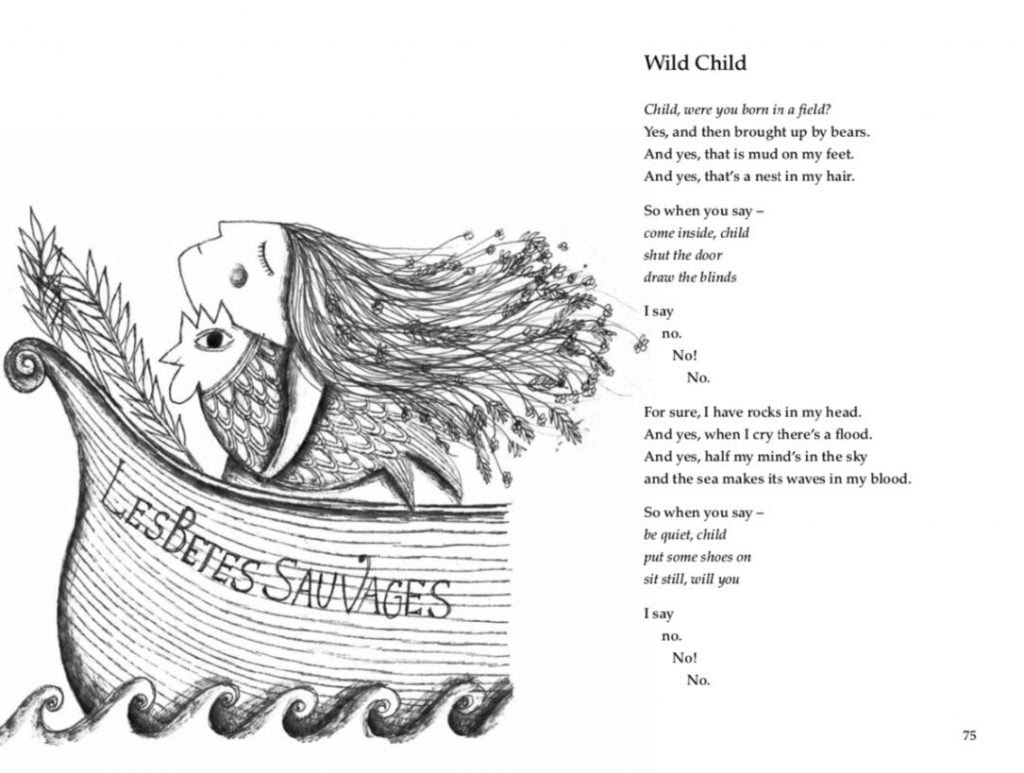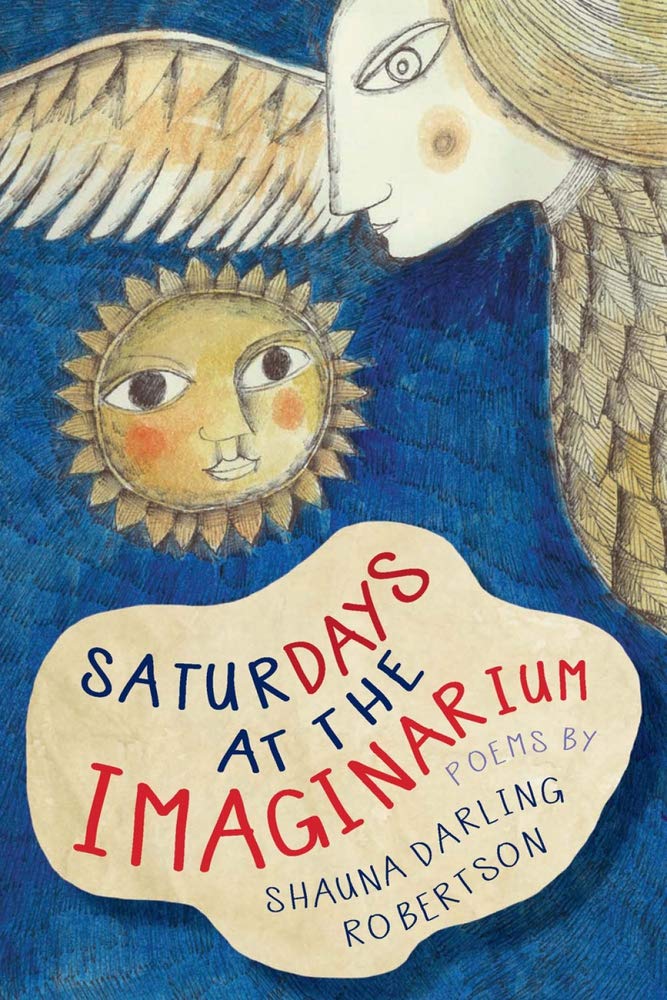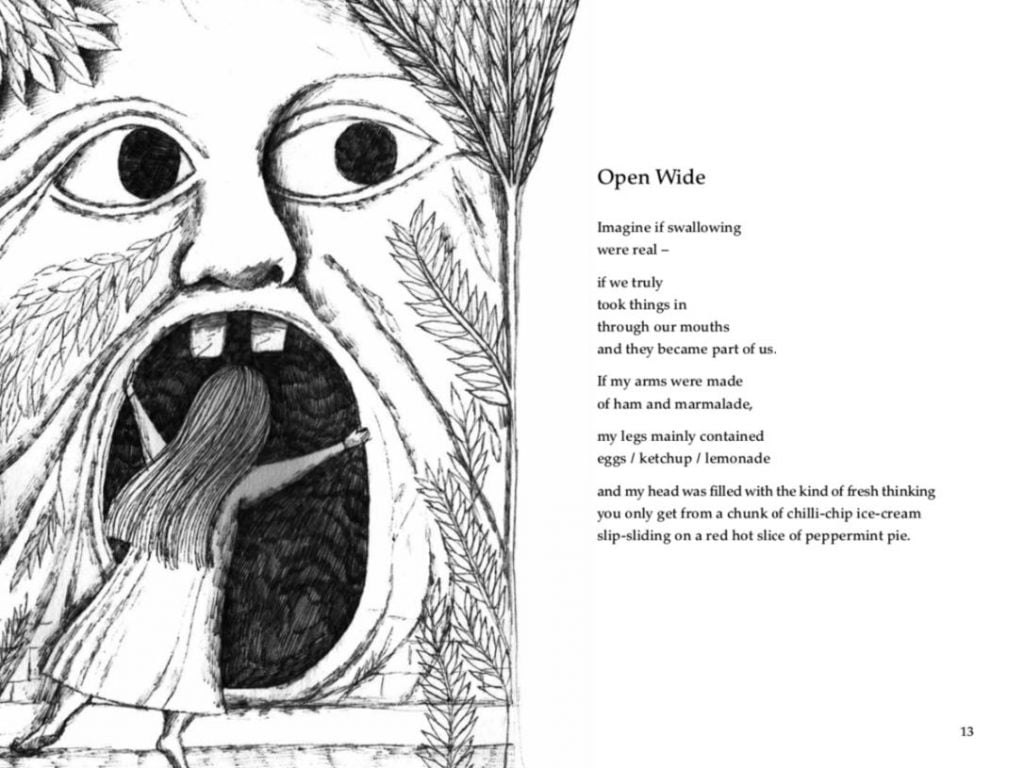Today, children’s poet Shauna Darling Robertson joins Ian Eagleton in The Reading Realm to talk about her magical, mysterious and delightful new poetry collection Saturdays at the Imaginarium…

Without giving too much away, can you tell us about your new poetry collection Saturdays at the Imaginarium?
The book invites young readers of all ages to explore the remarkable possibilities of their own imagination. It aims to encourage creative thinking, champion curiosity and revel in looking at things ever so slightly slant. Discover a world where ordinary things like eating and adverts seem quite preposterous, while unexpected things such as objects having feelings are quite commonplace. Thoughts fly around like mosquitoes, a day lasts longer than a year and the weather forecast predicts an ear-to-ear grin nearly two miles high. Oh and undercover magicians operate on every high street. The idea is to be both playful and thought-provoking, and hopefully to prompt some lively reflection and discussion.
You can watch a short trailer here!
In the introduction, you encourage your readers to use their imagination and to take time to be creative. In such a fast-moving world, do you think we’ve lost the ability to sit back and imagine?
It can certainly be tricky to find the time or the encouragement, as everything seems so busy and ‘do-do-do’ these days. But I don’t think we’ve lost the ability. If we’re alive, we’re constantly being creative whether we realise it or not. For example, whenever we think of a person who isn’t with us right now, or call to mind a place we’re not currently in, or plan something we might do tomorrow, or ponder something being different to how it currently is, we’re using our imagination. Every time we try to understand how someone else feels, we’re using our imagination. So it’s getting plenty of use. But it can be problematic too. For example, worrying is also something we do with our imagination. And things like prejudices and conflicts begin in people’s imagination. So it’s more a question of how, rather than if, we use it.
I love the illustrations in the collection by Jude Wisdom – they’re so strange, dark and odd! Can you remember the first time you saw them and what do you feel they bring to the book?
They’re magical, aren’t they? Roy Johnson, the book’s editor and publisher, discovered Jude’s artwork and thought it’d be perfect. I looked her up on Instagram and instantly agreed; her work reminded me of Marc Chagall who’s one of my favourite artists. I love that Jude’s illustrations don’t seek to over-explain the poems. I think it’s important to let readers form their own impressions when they engage with a poem, so I’m not keen on artwork that’s too obvious as it tend to ‘collapse’ the poem into one dominant interpretation rather than allowing for multiple nuances. Better to leave room for the imagination – especially in a book about the imagination! (Do look out for Jude’s picture book The Island, due out with Troika in February. It’s a beautiful story about migration and belonging.)

I loved the poem ‘The Dreamcatcher’ – it’s so magical and haunting. Can you tell us a bit more about this particular poem?
Thank you! Dreamcatchers come from Native American and First Nations cultures. They’re handmade crafts that were traditionally hung over the beds of sleeping children to protect them from bad dreams and evil spirits. I imagined what it might be like if I could actually catch my dreams in physical form. The poem is also inspired by my sister, Alexa, who’s has really vivid dreams. When we were kids the day would often begin with her telling us about the crazy adventures she’d had during the night!
I enjoyed all the different types of poems in the collection and finding out what a liwuli is! Do you have a favourite type of poem?
A confession: I only found out what a liwuli was while writing the book too! I don’t think I have a single favourite type of poem. What I love is the variety and the sense of possibility that poetry can offer. There are so many different ways we can approach poems – from spending hours perfecting a limerick to doodling a spontaneous sonnet in chalk on the pavement. We can also make poems into songs and pictures and comics and short films. We can display them on the sides of buses in place of advertising. Or slip them into someone’s pocket as a spontaneous gift. There’s a poem in the book about a character who gets up to all kinds of things with poems (it’s called ‘The Poetry Guerrilla’ and you can read and hear it here on the National Poetry Day 2020 website).

I was fascinated by A Matter of [ ]. What a wonderful way to get children playing with word choices! If I was a teacher and wanted to use a similar structure in class, how would I go about doing it?
Oh, great idea! I took a bunch of different phrases that people often say about time and then added a multiple choice of alternative words, to see what kind of images or thoughts that might conjure up in the mind. For example:
[Sub-Saharan Africa / Time / Wednesday] is a great healer.
I haven’t got [underwear / surfaces / time].
It’ll be different next [time / door / wardrobe].
You can choose any subject you like – such as other common expressions, recipes, the TV guide, lines from a classic story or a school text book, instruction leaflets, advertising slogans – anything at all. Choose a few short phrases from your text, then pick a key word in each phase to play around with (which might be a noun, an adjective, a verb, etc). The game is then to offer alternatives to that word. Mine were pretty much freestyle, but you can also set a specific challenge. For example, the words could be synonyms (I haven’t got time / hours / tempo), or rhymes (time / crime / slime), or maybe they begin and end with the same letter (time / tame / turtle). Or you can try something more abstract or playful – the possibilities are as wide as your imagination!
If you like playing with words and ideas, there are some ‘Imaginarium Extras’ on my website at www.shaunadarlingrobertson.com with creative exercises and explorations based on different poems in the book. I’m planning to add some more over time; if you want, you can subscribe to the blog and you’ll get an email telling you when a new post has been added.

Which children’s poetry books have you enjoyed reading recently?
I’ve been devouring books for adults and children by the American writer Naomi Shihab Nye, who’s the current Young People’s Poet Laureate in the USA. She’s an incredible writer, and also a wonderful champion of others’ writing. Right now I’m reading two of her anthologies: This Same Sky: A Collection of Poems from around the World, and Time You Let Me In: 25 Poets under 25.
Finally, can you describe Saturdays at the Imaginarium in three words?
Inventive. Playful. Provocative. (My publisher came up with those three – thanks Roy!).

